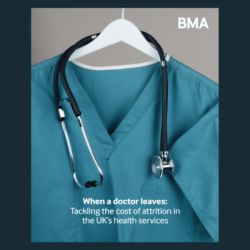The Allied Health Professions (AHPs), now comprising the third largest workforce in the NHS, will play an important role in the future delivery of integrated urgent care within the NHS, according to a new study commissioned by NHS Improvement and compiled by Kingston University.
The same study also indicates that the quality of leadership of the AHPs will be vital in determining their impact and the quality of care that patients receive. The study "Leadership of Allied Health Professions in Trusts: what exists and what matters" and its conclusions were presented at the fourth Chief Allied Health Professions Officer’s annual conference held in London.
“This study throws down the gauntlet to us all and sets out the challenges for both the AHPs and NHS trusts for the future. But, with the growing significance of the AHPs within the NHS, I know these are challenges we can meet as we go forward," said Suzanne Rastrick, the Chief Allied Health Professions Officer. “As the NHS celebrates its 70th birthday in July, this is an ideal time for AHPs to reflect on how they and their contribution to the health and care system have changed and can develop in the future.”
The AHPs include a range of professions such as art and music therapists, chiropodists/podiatrists, dietitians, occupational therapists, paramedics, and radiographers. These practitioners are regulated by the Health and Care Professions Council (HCPC).
AHPs help manage patients’ care throughout the life course from birth to palliative care. Their focus is on prevention and improvement of health and wellbeing to maximise the potential for individuals to live full and active lives within their family circles, social networks, education/training and the workplace.
Ruth May, Executive Director of Nursing at NHS Improvement, explained how the study highlights the variability within trusts regarding AHP leadership, and the opportunities for senior AHPs to develop as leaders.
She said that by starting the leadership self-assessment contained in the NHS Improvement’s new report, Directors of Nursing can work with their AHP leads to develop leadership arrangements that reflect their organisational and system needs and that encourage greater board engagement with the AHP professional offer.
As noted by May, AHPs have the skills and the scope to transform care across systems, notably in areas such as patient flow, urgent and emergency care and length of stay. "However, if we are to maximise their collective potential for quality improvement, we need to ensure that leadership arrangements within trusts are fit for purpose and reflect the value they bring," she added.
This year’s AHP conference invited several high profile speakers including NHS England’s Chief Executive Simon Stevens. Reflecting the increasing interest in AHPs, attendance at the conference has grown from around 250 delegates in 2015, to around 550 plus 19 high profile exhibitors at this year’s event.
Source: NHS England
Image Credit: Pixabay
Latest Articles
NHS, AHPs, integrated urgent care
The Allied Health Professions (AHPs), now comprising the third largest workforce in the NHS, will play an important role in the future delivery of integrated urgent care within the NHS, according to a new study commissioned by NHS Improvement and compiled



























